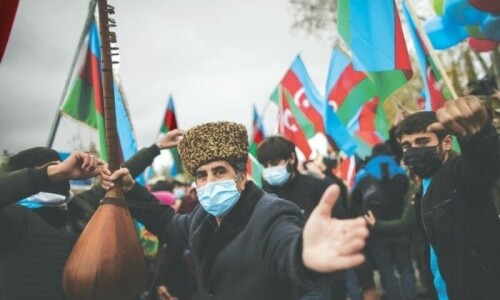BETWEEN the ignorance of US President Donald Trump and the malicious agenda of Indian Prime Minister Narendra Modi, a preposterous decision has been taken.
On Monday, hours before Mr Trump hosted Mr Modi in the White House, the US State Department listed Syed Salahuddin, a Pakistan-based Kashmiri separatist leader, as a specially designated global terrorist.
Indian memories may be short, and Mr Trump’s non-existent, when it comes to the people of India-held Kashmir and Salahuddin in particular, but the IHK-born leader is the very symbol of India’s failed policies in Kashmir.
Before India came to know Syed Salahuddin as a so-called terrorist, he was, in the 1980s, a young aspiring politician from Budgam in the Kashmir Valley. And much as the current Indian government has tried to cast him as a present-day menacing figure and lobbied the UN to have him declared a terrorist, his continuing influence in the disputed Kashmir region is far from clear.
What Mr Trump and his administration have succeeded in doing, however, is making clear to the people of IHK that they do not matter.
Suffering a spell of fresh and severe repression since the popular protests over the killing of Burhan Wani last July, the plight of the people of IHK did not merit a mention in any of the official statements or discussions between the Indian and US sides.
It is as if they do not exist and the self-proclaimed world’s largest democracy is not engaged in a daily, grotesque battle against unarmed civilians.
Historically, the US has encouraged Pakistan and India to engage in dialogue on all disputes and issues between the two countries.
But that encouragement is now meaningless if the US aligns itself with India on the Kashmir dispute.
For Pakistan, the challenge remains the same: mobilising world opinion against the violent Indian agenda in IHK. Whether it is the dysfunction in civil-military relations, the intransigence of the security establishment or the reluctance of the PML-N government, Pakistan has been unable to adapt its approach to India in the Modi era.
Perhaps this country’s own fraught history with militancy has made the outside world more sceptical of Pakistan’s claims when it comes to IHK, but the gross human rights abuses in the held territory are not a figment of Pakistani imagination.
Right-minded and sensible sections of Indian society, too, are horrified by the treatment that has been catalogued in countless video recordings and testimonies to have trickled out of IHK.
Thirty years ago, Syed Salahuddin was denied victory in a massively rigged election in IHK. That rigged election helped trigger an insurgency against Indian rule.
Thirty years on, India has re-embraced the idea that Kashmir can be crushed. But the only thing that may have changed is that the consequences of Indian oppression may be tragically worse.
Published in Dawn, June 30th, 2017











































